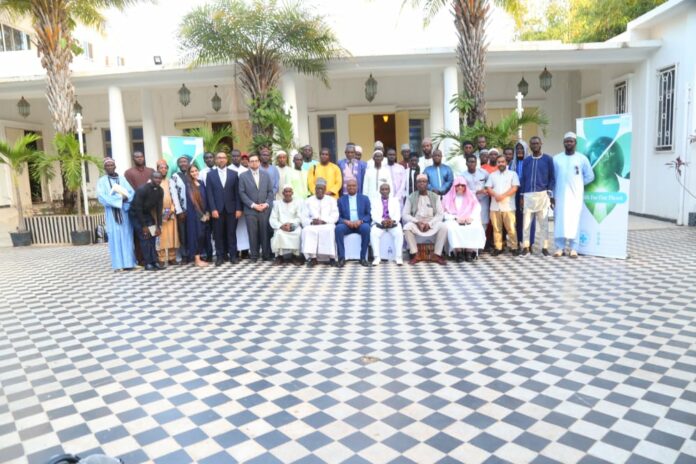By: Ousman Saidykhan
Last week dozens of Gambian faith leaders were trained by Faith For Our Planet to use faith-based approaches for climate advocacy. The workshop, the first of its kind in the Gambia was held at the Coco Ocean Hotel in Kololi on Thursday, 8th of December 2022.
Faith For Our Planet (FFOP) is an NGO convened by Dr. Mohamed bin Abdulkarim Al Issa, Secretary General of the Muslim World League for both interfaith and civil society leaders.
The specialised day-long training was organised by FFOP in partnership with the Commonwealth Africa Initiative and Mugassy Foundation. The event brought together activists, faith leaders and politicians from eight different African countries.
One panel discussion featured prominent faith leaders like Yshaua’u El-Sunais Sani, Founder of ‘Islam for Green Climate’ in Nigeria, Reverend Agostao Zitha, National Program Director of the Christian Council of Mozambique, as well as Gambian lawmaker, Abdoulie Njai who is a member of the National Assembly.
“This is the way we must address the threats of climate change by building a broad-based coalition and this again is one of the important reasons to address faith leaders such as yourselves given the role the faith community plays in setting environmentalist norms and values; anchored in the traditions of our country’s various faiths,” said Permanent Secretary Alieu Njie, in a speech delivered on behalf of the Minister of Environment, Climate Change and Natural Resources.
The Global Program Coordinator of Faith For Our Planet, Farwah Gulamali Khataw, pointed out the fact that the majority of the world’s population adheres to some faith, adding that this gives the faith leaders power and influence to play a crucial part in championing such environment preservation and climate advocacy.
The Gambia Government has on several occasions talked about its commitment to Paris Agreement; an agreement that was adopted by Parties at COP21 in Paris, on 12 December 2015. It seeks to reduce global greenhouse gas emissions to limit global warming to below 2 or preferably to 1.5 degrees Celsius.
However, the faith leaders, who are seen by Faith for Our Planet as so instrumental in fighting against environmental predicaments have not been fully engaged.
The founder of the Islamic Cultural Centre for Women and Children (ICCWC), Aja Maimuna Savage, underscored the importance of such training workshops and promised they will share the knowledge gained from there.
“We thank God that we have learnt a lot from the presenters here today. It is now our role to preach to others about what we learnt from this workshop. So really, we are going to do our best,” said the renowned female scholar, who is also the Muslim Religious Programme presenter on GRTS, the state broadcaster.
Another participant, Pastor Abdou Salam Dem Sisse said: “I believe that, yes, God has done his own part. But most of these environmental changes are being caused by man. So, I have to tell my people what to do next so that we get (away) from that calamity.”
The prominent pastor believes things will change if workshops like this are often organised to inform faith leaders.
Honourable Abdoulie Njai has also hailed the training workshop that brought together participants from different faiths as “quite timely”. The National Assembly Member of Banjul Central also served in the panel with two renowned religious personalities that discussed issues including gaps in the current climate action approaches.
“Not including these people in the climatic discourse, I think really limits the advocacy to a certain level – because these are people who use their platforms to commit with the masses, especially at the grassroots level. So, I think this convergence – liberating them in terms of the climatic discourse is quite important,” Honorable Njai said.
The training workshop in the Gambia was hailed as a success in equipping faith leaders with the knowledge and skills to inspire climate action in their congregations and communities. As well as facilitating their partnership with governmental, political, and civil society actors.




